
Bing for mobile is a search tool for handheld mobile devices from Microsoft as part of their Bing search engine. It is designed for mobile device displays. Bing Mobile is built into Windows Mobile and Windows Phone as proprietary software, accessed via the Search key on Windows Phone 7 and Windows Phone 8 devices. It is also available on Windows Phone 8.1, and can be downloaded for other platforms, including and Android.

Microsoft Software Updater is a Windows and OS X based application launched in 2006, that enables customers to update and recover their mobile device firmware of a S40 or S60 or Lumia device from any Internet enabled access point. To avoid data loss users are prompted with on-screen advice on how to safely update their device.
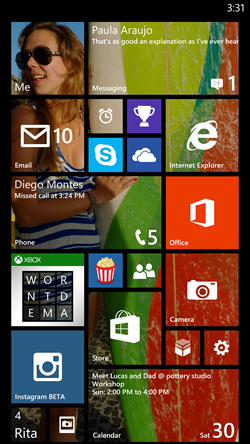
Windows Phone (WP) is a discontinued mobile operating system developed by Microsoft Mobile for smartphones as the replacement successor to Windows Mobile and Zune. Windows Phone featured a new user interface derived from the Metro design language. Unlike Windows Mobile, it was primarily aimed at the consumer market rather than the enterprise market.

MixRadio was an online music streaming service owned by Line Corporation. The service was first introduced by Nokia in 2011 as Nokia Music for Windows Phone, serving as a successor to Nokia's previous Nokia Music Store/Comes with Music/Ovi Music Store initiatives, which was based on the LoudEye/OD2 platform. After its acquisition of Nokia's mobile phone business, the service was briefly maintained by Microsoft Mobile Oy before it was sold to Japanese internet company Line Corporation in 2015. Following the acquisition, MixRadio expanded to Android and iOS in May 2015.
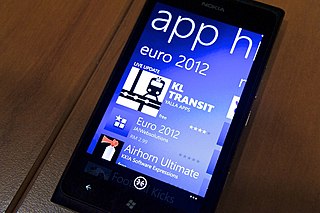
The Nokia Lumia 900 is a Windows Phone-powered smartphone, first unveiled on January 9, 2012, by Nokia at Consumer Electronics Show 2012, where it won the Best Smartphone award in January 2012. The phone has 4G LTE support and was released in April 2012. The Lumia 900 was the flagship smartphone of the Lumia range until the release of its successor, the Lumia 920.

Microsoft Lumia is a discontinued line of mobile devices that was originally designed and marketed by Nokia and later by Microsoft Mobile. Introduced in November 2011, the line was the result of a long-term partnership between Nokia and Microsoft—as such, Lumia smartphones run on Microsoft software, the Windows Phone operating system; and later the newer Windows 10 Mobile. The Lumia name is derived from the partitive plural form of the Finnish word lumi, meaning "snow".
Microsoft mobile services are a set of proprietary mobile services created specifically for mobile devices; they are typically offered through mobile applications and mobile browser for Windows Phone platforms, BREW, and Java. Microsoft's mobile services are typically connected with a Microsoft account and often come preinstalled on Microsoft's own mobile operating systems while they are offered via various means for other platforms. Microsoft started to develop for mobile computing platforms with the launch of Windows CE in 1996 and later added Microsoft's Pocket Office suite to their Handheld PC line of PDAs in April 2000. From December 2014 to June 2015, Microsoft made a number of corporate acquisitions, buying several of the top applications listed in Google Play and the App Store including Acompli, Sunrise Calendar, Datazen, Wunderlist, Echo Notification Lockscreen, and MileIQ.
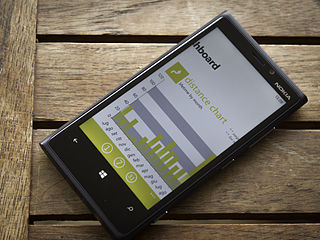
Nokia Lumia 920 is a smartphone developed by Nokia that runs the Windows Phone 8 operating system. It was announced on September 5, 2012, and was first released on November 2, 2012. It has a 1.5 GHz dual-core Qualcomm Krait CPU and a 4.5" IPS TFT LCD display, as well as a high-sensitivity capacitive touchscreen that can be used with gloves and fingernails; the display is covered by curved Gorilla Glass and has a 9 ms response time. The phone features an 8.7-megapixel PureView camera with OIS; it was the first smartphone camera to implement that technology, as well as to support Qi inductive charging. The phone comes with 32 GB of internal storage, but has no expandable storage.

Nokia PureView is the branding of a combination of technologies used in cameras of Nokia-branded smartphones and previously, in phones by Microsoft Mobile. PureView was first introduced with the Nokia 808 PureView.
The Nokia Lumia 810 is a Windows Phone smartphone made by Nokia exclusively for wireless carrier T-Mobile US. It was announced on October 8, 2012. The device runs the then-new Windows Phone 8 operating system and features a 4.3-inch AMOLED WVGA ClearBlack display, an 8-megapixel rear-facing camera, a 1.5 GHz Snapdragon processor, exchangeable shells and supports Qi inductive charging when equipped with a specific shell. It supports T-Mobile's 4G network.

The Nokia Lumia 520 is an entry-level Windows Phone 8 smartphone announced by Nokia at the 2013 Mobile World Congress.

Lumia imaging apps are imaging applications by Microsoft Mobile and formerly by Nokia for Lumia devices built on the technology of Scalado. The Lumia imaging applications were notably all branded with "Nokia" in front of their names, but after Microsoft acquired Nokia's devices and services business the Nokia branding was superseded with "Lumia", and often updates included nothing but name changes, but for the Lumia Camera this included a new wide range of feature additions. Most of the imaging applications are developed by the Microsoft Lund division. As part of the release of Windows 10 Mobile and the integration of Lumia imaging features into the Windows Camera and Microsoft Photos applications some of these applications stopped working in October 2015.
Nokia Xpress is a discontinued mobile browser developed by Nokia and supported by Microsoft until the end of 2015. It came loaded by default with Series 40, Asha Platform and Nokia X Software Platform. It uses the Gecko rendering engine. On Nokia feature phones it was replaced by Opera browser in early 2015.

The Nokia X family was a range of budget smartphones that was produced and marketed by Microsoft Mobile, originally introduced in February 2014 by Nokia. The smartphones run on the Nokia X platform, a Linux-based operating system which was a fork of Android. Nokia X is also known generally as the Nokia Normandy. It is regarded as Nokia's first Android device during the company's Microsoft partnership and was in the process of selling its mobile phone business to Microsoft, which eventually happened two months later.

Microsoft Mobile Oy was a Finland subsidiary of Microsoft Devices involved in the development and manufacturing of mobile phones. Based in Keilaniemi, Espoo, it was established in 2014 following the acquisition of Nokia's Devices and Services division by Microsoft in a deal valued at €5.4 billion, which was completed in April 2014. Nokia's then-CEO, Stephen Elop, joined Microsoft as president of its Devices division following the acquisition, and the acquisition was part of Steve Ballmer's strategy to turn Microsoft into a "devices and services" company. Under a 10-year licensing agreement, Microsoft Mobile held rights to sell feature phones running the S30/S30+ platform under the Nokia brand.
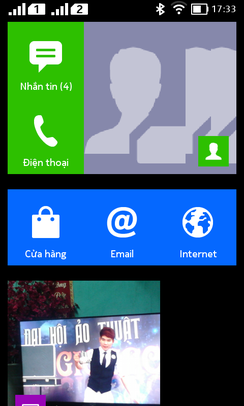
The Nokia X platform was a Linux-based mobile operating system and software platform originally developed by Nokia, and subsequently by Microsoft Mobile. Introduced on 24 February 2014, it was forked from Android and used on all the devices of the Nokia X family. It was also the next Nokia Linux project after the ill-fated MeeGo.
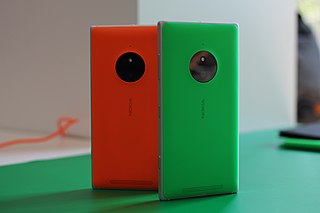
The Nokia Lumia 830 is a smartphone developed by Nokia and released by Microsoft Mobile that runs Microsoft's Windows Phone 8.1 operating system. It was announced on September 4, 2014 at Internationale Funkausstellung Berlin, just a few months after Microsoft bought Nokia's mobile division and renamed it Microsoft Mobile. It was released in October 2014. It is a successor to the 2012 Nokia Lumia 820 and marketed as an "affordable flagship".
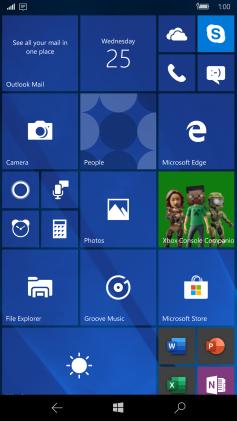
Windows 10 Mobile is a discontinued mobile operating system developed by Microsoft Mobile. First released in 2015, it is the successor to Windows Phone 8.1, but was marketed by Microsoft as being an edition of its PC operating system Windows 10.

The Microsoft Garage is a Microsoft program that encourages employees to work on projects about which they are passionate, despite having no relation to their primary function within the company. Employees from all divisions of Microsoft are free to take part in Microsoft Garage activities and small-scale innovation projects. The Microsoft Garage is a global program with locations on the main campus in Redmond, Washington, and several others spread all over the world, and a website that launched in October 2014 to share experimental projects with customers.

Human Mobile Devices (HMD), formally HMD Global, is a Finnish independent mobile phone manufacturer. The company is owned by the Luxembourgish holding company Smart Connect GL. The company is made up of the mobile phone business that the Nokia Corporation sold to Microsoft in 2014, then bought back in 2016. HMD began marketing Nokia-branded smartphones and feature phones on 1 December 2016. The company has exclusive rights to the Nokia brand for mobile phones through a licensing agreement. The HMD brand was initially only used for corporate purposes and does not appear in advertising, whereas the name "Nokia Mobile" is used on social media. In January 2024, HMD rebranded to 'Human Mobile Devices' and will use its branding on future devices alongside that of Nokia.



















